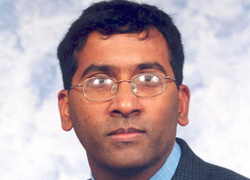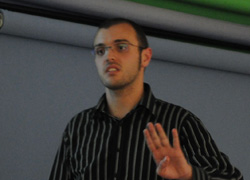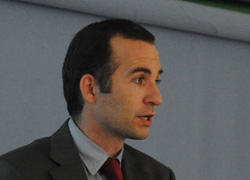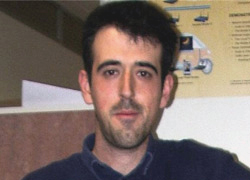IMDEA Networks

Event Category: In-house Presentation
Design and Evaluation of a robust delay-based congestion protocol
Many delay-based congestion protocols have been proposed. Some recent studies have questioned the validity of congestion prediction at end hosts Based on measurement studies. In this talk, we show that end-host based delay prediction can be more accurate than previously characterized. We propose PERT (Probabilistic Early Response TCP) to mitigate the uncertainties in end-host based congestion prediction. PERT emulates the behavior of AQM/ECN in the end hosts' response to congestion.
Seguir leyendo arrow_right_altComputing: A small step from Classical to Quantum
The Theory of Computing is almost a hundred year old now. Its roots can actually be traced to the Entscheidungsproblem posed by David Hilbert in 1928. Another concrete theory in Physics called the Quantum Mechanics had its inceptions almost two hundred years ago (with Thomas Young's Double Slit Experiment in 1803) but actually started in the late 19th century. Today, Quantum Mechanics is proven to be the most successful theory of Physics. So the natural question to ask was that while the statement of Church-Turing Thesis is seen to be a statement of physics (laws of nature), then it should be compatible with the theory of Quantum Mechanics!
Seguir leyendo arrow_right_altCloud elasticity at a flat fee
Existing cloud computing platforms offer virtually unlimited compute resources (virtual machines, bandwidth, storage, etc.) that can be used on demand. Such on-demand model offers significant elasticity to the customers in terms when and where they use the resources. The existing pricing model, however, is pay-as-you-go which in turn can lead to unpredictable costs to the cloud customers. This talk will discuss two adaptive approaches for resource control under a fixed budget: Distributed Rate Limiting (DRL) and Temporal Rate Limiting (TRL). DRL is a fully decentralized mechanism for resource control over a distributed cloud service, that splits the available budget among the participating nodes subject to the load each node experiences. TRL in contrast, splits the budget over a time period, to optimize the performance of the customer with demand pattern that varies in time.
Seguir leyendo arrow_right_altConferencia: Analysis and Experimental study of operational 802.11-based Wireless Mesh Networks
Existing cloud computing platforms offer virtually unlimited compute resources (virtual machines, bandwidth, storage, etc.) that can be used on demand. Such on-demand model offers significant elasticity to the customers in terms when and where they use the resources. The existing pricing model, however, is pay-as-you-go which in turn can lead to unpredictable costs to the cloud customers. This talk will discuss two adaptive approaches for resource control under a fixed budget: Distributed Rate Limiting (DRL) and Temporal Rate Limiting (TRL). DRL is a fully decentralized mechanism for resource control over a distributed cloud service, that splits the available budget among the participating nodes subject to the load each node experiences. TRL in contrast, splits the budget over a time period, to optimize the performance of the customer with demand pattern that varies in time.
Seguir leyendo arrow_right_altThe pain of doing research with real (wireless) devices
A lot of attention has been given to multihop wireless networks lately. This attention has motivated an increase in the number of 802.11-based deployments, both indoor and outdoor, used to perform measurement studies to analyze WLAN performance by means of wireless sniffers that passively capture transmitted frames. In this talk talk we will introduce some of the major issues that systems researchers have to address when performing such measurements: i) on one hand, the testbed itself requires a significant amount of resources during both its deployment and its maintenance, and they require a "calibration" phase before running the experiments given that as off-the-shelf devices have recently been shown to deviate from the expected behavior--in this talk we summarize a few lessons learned from the deployment of a 28-node wireless testbed; ii) on the other hand, little attention has been given to the fidelity of an individual device, i.e., the ability of a given sniffer to capture all frames that could have been captured by a more faithful device. We assess this fidelity by running controlled experiments, and show that it varies significantly across sniffers, both quantitatively and qualitatively.
Seguir leyendo arrow_right_altCharacterizing the Behavior of Content Publishers in BitTorrent
Due to the increasing popularity of P2P systems and their contribution to overall Internet traffic, it is essential to understand how content, which is the main attraction in P2P systems, is fed. The main goal of this talk is to identify and characterize those communities of users that are primarily responsible for publishing/feeding content in BitTorrent. For this purpose we have performed two large scale measurement studies that collectively identify the feeders of more than 30k torrents. Out of these measurements we conclude that a significant part of the BitTorrent’s content (40%) is fed by two different groups: (i) users concentrated min a few IP addresses of Hosting Service Providers. In particular, there is a single Hosting Provider in this community that alone is responsible of feeding 25% of the content published in the current major BitTorrent Portal. (ii) A large number of regular BitTorrent users spread across the networks of big ISPs. In addition, we characterize how the feeders of both communities behave, finding out that the typical Hosting Providers feeder (i) publishes a larger number of torrents that become more popular and (ii) seeds longer its torrents than regular users acting as feeders. Our findings suggest that a small group of users in Hosting Providers effectively leverage BitTorrent to publish content. Therefore, their presence is essential for the livelihood of BitTorrent.
Seguir leyendo arrow_right_altEnergy Efficient Wireless Internet Access with Cooperative Cellular Networks
Marco Ajmone Marsan holds a double appointment as Chief Researcher at IMDEA Networks (Spain) and Full Professor at the Department of Electronics (Dipartimento di Elettronica) of the Politecnico di Torino (Polytechnic University of Turin) (Italy). He is the founder of the Telecommunication Networks Group, one of the top research groups in networking in Europe, based at the Politecnico di Torino.
Seguir leyendo arrow_right_altAn analytical model for a Cache Assisted IPv6 Address Autoconfiguration protocol for VANETs
Vehicular communications will increase road safety, traffic efficiency and driving comfort, by enabling vehicles to form Vehicular Ad-hoc Networks (VANETs) and to directly exchange information. Additionally, connecting the VANET to an IP based network infrastructure (e.g., the Internet) may enhance those applications, and creating the opportunity for others such as infotainment ones (e.g., games, web browsing, e-mail, etc.). One of the functionalities needed to bring IP to vehicular networks is the capability of vehicles to autoconfigure an IPv6 address. GeoSAC is a mechanism enabling IPv6 address autoconfiguration in vehicular networks based on geographic routing. In GeoSAC, as a result of the mobility of the vehicles, they cannot always use the same IP address. Each new address configuration introduces a delay during which communications are interrupted. We propose an improvement for GeoSAC, based on the caching of Router Advertisements, to avoid this disruption time. We also analytically model the probability of achieving seamless IP address reconfiguration as well as an expression for the average configuration time of nodes. The model is validated through extensive simulation. Results in different realistic scenarios show that the use of our proposed optimisation is valuable and would improve the performance in terms of configuration time and/or signaling overhead and the average configuration time expression would provide network administrators with a powerful tool that can be used during the network design.
Seguir leyendo arrow_right_altA Control Theoretic Approach to Distributed Optimal Configuration of 802.11 WLANs
The optimal configuration of the contention parameters of a WLAN depends on the network conditions in terms of number of stations and the traffic they generate. Following this observation, a considerable effort in the literature has been devoted to the design of distributed algorithms that optimally configure the WLAN parameters based on current conditions. In this work we propose a novel algorithm that, in contrast to previous proposals which are mostly based on heuristics, is sustained by mathematical foundations from multivariable control theory. A key advantage of the algorithm over existing approaches is that it is compliant with the 802.11 standard and can be implemented with current wireless cards without introducing any changes into the hardware or firmware. We study the performance of our proposal by means of theoretical analysis, simulations and a real implementation. Results show that the algorithm substantially outperforms previous approaches in terms of throughput and delay.
Seguir leyendo arrow_right_altWhen the network follows the mobile: extensions to Proxy Mobile IPv6
Users' demands for Internet connectivity anytime anywhere are no longer a future requirement, but a reality that operators face today. The current trend in hand-held devices, equipped with multiple access technologies, and accessing IP data services triggered the need for mobility support managed by the IP layer. However, the complexity of protocols such as Mobile IP complicated the deployment of solutions in real products. Lately, there is a new trend toward solutions that enable the mobility of IP devices with a local domain with only the support from the network. Proxy Mobile IPv6 is the solution standardized by the IETF that follows this "novel" approach.
Seguir leyendo arrow_right_alt











Comentarios recientes